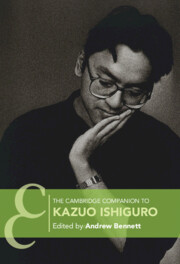Book contents
- The Cambridge Companion to Kazuo Ishiguro
- The Cambridge Companion to Kazuo Ishiguro
- Copyright page
- Contents
- Figures
- Contributors
- Acknowledgements
- Chronology
- Abbreviations
- Introduction
- Part I Kazuo Ishiguro in the World
- Part II Literature, Music, and Film
- Part III Ethics, Affect, Agency, and Memory
- 12 Ethics and Agency in Ishiguro’s Novels
- 13 ‘Emotional Upheaval’ in An Artist of the Floating World and The Buried Giant
- 14 Ishiguro and Love
- 15 Memory and Understanding in Ishiguro
- 16 Ishiguro’s Irresolution
- Guide to Further Reading
- Index
- Cambridge Companions To …
12 - Ethics and Agency in Ishiguro’s Novels
from Part III - Ethics, Affect, Agency, and Memory
Published online by Cambridge University Press: 16 March 2023
- The Cambridge Companion to Kazuo Ishiguro
- The Cambridge Companion to Kazuo Ishiguro
- Copyright page
- Contents
- Figures
- Contributors
- Acknowledgements
- Chronology
- Abbreviations
- Introduction
- Part I Kazuo Ishiguro in the World
- Part II Literature, Music, and Film
- Part III Ethics, Affect, Agency, and Memory
- 12 Ethics and Agency in Ishiguro’s Novels
- 13 ‘Emotional Upheaval’ in An Artist of the Floating World and The Buried Giant
- 14 Ishiguro and Love
- 15 Memory and Understanding in Ishiguro
- 16 Ishiguro’s Irresolution
- Guide to Further Reading
- Index
- Cambridge Companions To …
Summary
This chapter argues that Ishiguro’s novels frame ethical issues through questions of agency. Hannah Arendt’s ideas about agency and action provide a way to understand this in detail: for Arendt, speech and action reveal ‘who’ the speaker is, and shows their involvement with the ‘web of human relationships’ and the ramifications of their actions; the representation of action is inextricable from style and form. Using these ideas, the chapter demonstrates that there are significant changes over Ishiguro’s work: the first three novels concern reflections on past actions; the second three explore different conditions of agency in both content and in style; the two most recent novels deal with the impact and risks of actions and reactions. This also illuminates two recognizable literary devices used by Ishiguro: the way his characters ‘project’ themselves onto others, and what he calls the ‘dream grammar’ in relation to some aspects of his prose and plotting.
- Type
- Chapter
- Information
- The Cambridge Companion to Kazuo Ishiguro , pp. 187 - 199Publisher: Cambridge University PressPrint publication year: 2023
- 1
- Cited by

